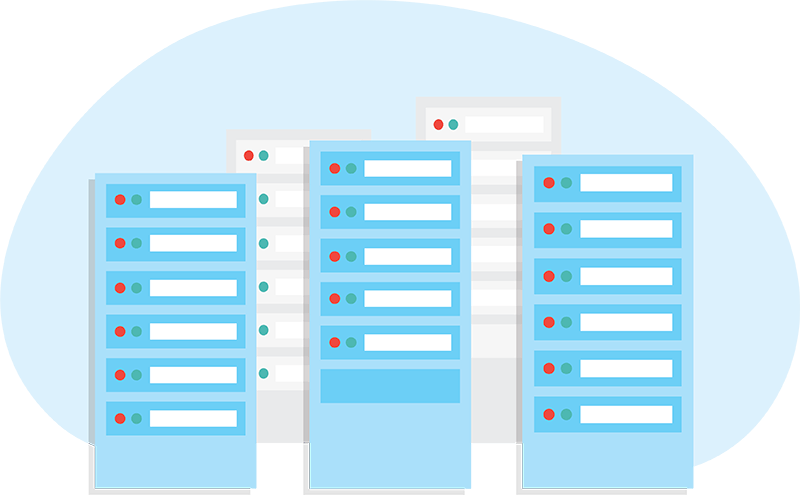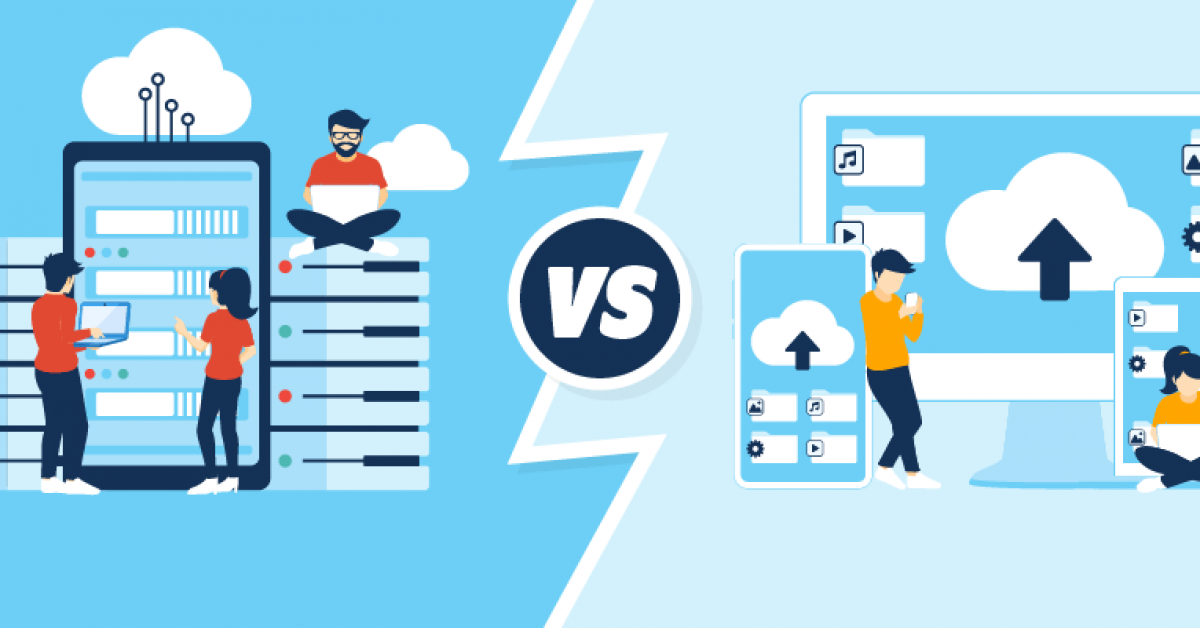We are living in the age of information. Now more than ever, businesses are in need of secure and reliable data management. When searching for third-party data storage and management, businesses typically have two options: colocation and cloud storage. Colocation and cloud storage offer businesses alternatives to housing data based on the businesses specific requirements, and each service has its own set of capabilities.
The difference? Colocation involves a customer moving their servers and hardware into a data center and using its power, internet connection, cooling and security systems. Cloud storage involves the customer or business utilizing the providers servers and hardware to store data or run systems.
We’re all familiar with the term “data breach” and the constant headlines popping up about companies’ private information being pilfered. Outsourcing these data management services helps organizations maintain security and off-load resources. Let’s dive in further.

Colocation
If your organization has already made a significant investment in a physical IT infrastructure (like servers, hard drives and other computing resources), colocation may be a valid solution for you.
Businesses who collocate benefit from more than just rented server space. Colocation services offer access to the data center’s power and cooling infrastructure, which is provided at a much lower cost due to the data centers economics of scale and better efficiency standards. Colocating assets also allows companies to utilize the data center’s connectivity options to access a variety of services that would be much more difficult to implement with an in-house solution.
For companies that must abide by strict compliance regulations for data protection, colocation services ensure that they maintain total control over their equipment and data. TelNet meets PCI DSS, AICPA SOC 2® Type II, HIPAA and ISO 27001 compliance regulations with our data center solutions.
A good colocation data center will also provide intelligent monitoring platforms to allow clients to monitor their data at all times. CCTV/Video Surveillance with 90 Day Video Storage, 24/7/365 Network Operations Center (NOC) Services and 24/7/365 Complete Environmental Monitoring and Reporting Systems (DCIM) are some of the intelligent monitoring platforms that TelNet offers.
Intelligent monitoring platforms are one way colocation provides business owners and IT professionals with confidence that their equipment is safe and they have total control over their physical infrastructure. These monitoring tools offer the same visibility and access organizations would expect from their own private data center without the extra facility expenditure.
Colocation services are also a good option for organizations looking to back up their data in the event of an emergency or disaster. Colocating data assets meets a diverse range of needs. We will likely see more businesses utilizing data centers and colocation in the future.

Cloud Storage
What if an organization hasn’t made the investment of purchasing their own hardware? Or they maintain their own physical network infrastructure and are tired of paying for server upgrades and replacing faulty components? Cloud storage may be the solution.
Cloud hosting services work similar to colocation, except the space companies are renting to store their assets and run their day-to-day systems are virtual, not physical. After deciding on a cloud provider an organization migrates its data and applications from its own physical servers into the cloud provider’s virtualized servers.
By handing the operations of infrastructure management over to the cloud provider, they free up their IT departments to focus on other projects. You’d rather have your personnel spending time developing innovative solutions to direct better business results, not troubleshooting server issues.
For cloud service customers the cloud isn’t a physical space, because of this it’s far more flexible than a traditional IT infrastructure. When a company needs to increase its data storage capacity or increase its processing power, it can purchase more of the appropriate services from its cloud provider. This makes it easy for cloud-based organizations to scale operations quickly. Cloud providers typically offer subscription-based models and businesses pay for the storage and infrastructure they need. If businesses need more storage or processing power down the road, they simply increase their subscription and associated costs.
The biggest challenge for some businesses when transitioning to cloud hosting services is the loss of control. While businesses can still access their data and applications, they don’t actually own or manage the servers where their data is stored. For some companies, this lack of transparency and control is a deal breaker.
There can also be security concerns encompassing cloud services. Although cloud service providers are careful to keep each cloud siloed, there is always the risk that a data breach involving one cloud customer could compromise others within the cloud providers network. Organizations should also consider using an established cloud provider because if their current provider goes out of business, they don’t want to be scrambling to find a secure host for their data.

Let’s Talk Dollars
Colocation services can sometimes come with higher upfront costs than cloud-based solutions. When using colocation, organizations may need to purchase hardware themselves, then migrate their data to a cloud provider’s servers. However, the long term costs associated with cloud storage services exceed those of colocation. Cloud services are scalable and offer flexibility, but gaining access to these features can become very expensive, very quickly.
Colocation is also more cost effective than in-house storage solutions as storing and operating data either in a private data center or a dedicated server room requires tremendous power, temperature and humidity controls to keep everything running optimally. The expense of running this equipment daily is not something most business owners want to pay. When a company colocates, it rents out space in a third-party data center and houses its equipment in their facility.

To Sum it Up
The main difference between colocation and cloud services is the way the data is stored and managed. Colocation provides physical assets while cloud storage provides virtual ones. Like colocation, cloud-based services present cost savings because facility or server space is shared.
With cloud services, the cloud provider manages your servers, storage and a network to access the info. With cloud storage the provider (rather than the business) is responsible for setting up this infrastructure. Colocation requires businesses to set up their own servers, storage and network. Some businesses choose cloud services because of their ability to rapidly scale data capacity up or down, based on varying business needs.
But convenience brings cost. Cloud providers offer the benefit of storing and managing data for businesses, but the costs for hosting that data increase when the data increases. More data means additional storage and costs. Colocation presents up front hardware expenses but is less costly over time, because businesses only rent space for servers and data storage equipment and not the data storage itself.
It comes down to figuring out which data management service is the right fit for your business. If you’d like to talk through your options, feel free to reach out to us. We’ve got fully-redundant colocation services ready for you.




